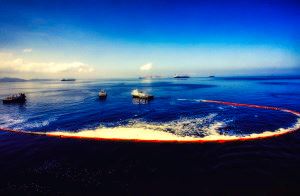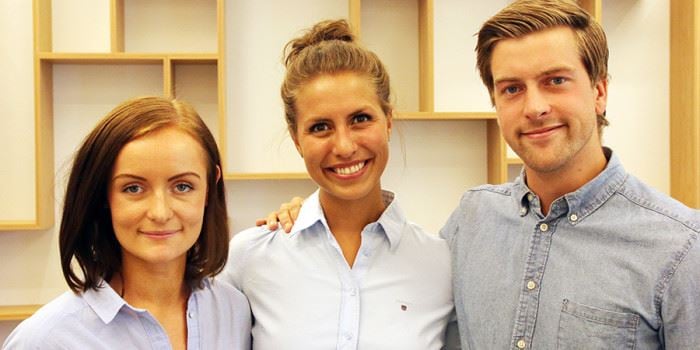OIL SPILL CLEANUP: Oil spills happen all the time in the ocean, all over the world. We usually only read about the big catastrophes, like the BP oil spill in the Gulf of Mexico, but there were 40 smaller maritime oils spills in Norway alone during the course of last year.
The current standard cleanup method uses chemicals to disperse the oil into small enough particles for natural bacteria in the ocean to be able to digest.
However, research on this process shows that the chemicals can actually slow or stop the breakdown process, and adding unnatural chemicals to delicate ecosystems is less than optimal.
“We really don’t know enough about how these chemicals affect the microbial ecosystems in our oceans, and there is some discussion as to whether these compounds prevent bacteria from being able to properly break down the oil,” says Anette Andersen of ChemFree, a new startup created by Andersen and two other students from NTNU’s School of Entrepreneurship in search of an environmentally friendly way to handle oil spills.

Oil spills happen — but what if there was a better way to clean them up rather than by using chemicals? Photo: Thinkstock
Click to open
No chemicals, just water
As its name suggests, ChemFree does not rely on unwanted chemicals for cleanup. The technology involves spraying sea water into an oil spill with enough force to disperse the oil in tiny particles, allowing it to be properly broken down by ocean bacteria. Think of it like a giant high pressure washer.
Lab tests show that this method actually disperses smaller particles than chemical methods do, meaning that it is even easier for the ocean’s bacterial janitorial team to do its work.
Entrepreneurs at work
Andersen and her colleagues, Nina Heir and Karl Nevland, have spent three years in different study programmes at NTNU, and then started a year ago in the NTNU School of Entrepreneurship’s two-year master’s programme. Their goal with ChemFree is to have created a workplace for themselves by the time they finish their master’s degrees. And they’re on the right track.
“We complement each other with expertise in different fields,” Karl Nevland explains.
The man behind the original idea is Stein Erik Sørstrøm, who works at SINTEF, where the technology is in development. ChemFree is patented, and the rights to it will be transferred from SINTEF TTO (SINTEF’s commercialization arm) to ChemFree as soon as the new company is up and running.
They’ve had good results during lab tests of the technology. The next step is to test the technology at full scale, using a prototype that is currently being developed. It will be tested some time this autumn.
Award-winning technology
The students’ work with ChemFree has already won several prizes. ChemFree won the prize for best international contribution, as well as the prize for best master’s project in the international finals of Green Challenge in Copenhagen earlier this summer.
“Monetary prizes like this are incredibly valuable for a startup company. Previously, we’ve received aid from Spark and Trønderenergi, which has allowed us to travel around the world and meet with potential future clients. Meetings like this could easily be a deciding factor of our company’s success at an important milestone,” says Heir.
The students’ project won third place in the Norwegian Climate LaunchPad finals, which were arranged at NTNU in May, This placement allowed them to participate in the European Climate LaunchPad finals, Europe’s largest idea contest for green solutions to climate-related issues, although they did not win.
They competed against 84 other innovative green entrepreneurs from all over Europe. The top ten ideas are given access to Climate-KIC Accelerator, an 18-month-long acceleration programme for startup companies, with the possibility for as much as 95 000 euros in financial support.
International sector, a growing community
As part of their entrepreneurship studies, Heir and Nevland spent three months at Boston University, where they were able to establish important contacts within the oil cleanup industry in the USA and Canada.
“We’re moving into an international sector, and as such it is important to make contact with future customers at an early stage. Through our work in Boston, we’ve made a lot of progress,” they said.
The trio also had a speed date with Norway’s crown prince during the opening of NTNU’s new Gløshaugen Innovation Centre in mid-August.
“It’s good that the innovation and entrepreneurship community at NTNU is being given more focus, and allowed to grow,” Heir said at the opening of the Innovation Centre. “I believe that collecting and strengthening the community is important, so that more smart, creative heads can get to work and help each other out. It is more important than ever that we focus on sustainability and environmentally friendly solutions. Entrepreneurship and innovation from students is also important, so that Norway can contribute as much as possible to sustainable growth globally.”
Read more about ChemFree and other startups from the NTNU School of Entrepreneurship.

